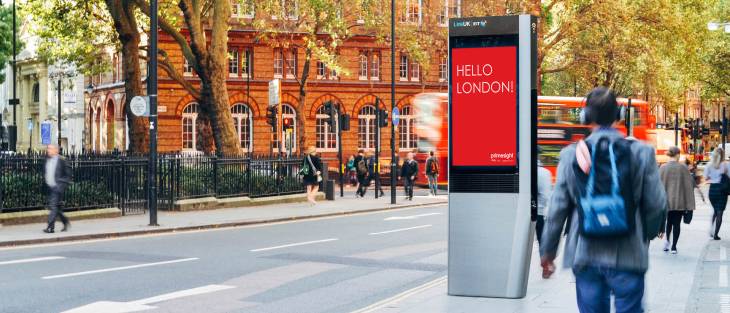London’s iconic red phone boxes may be mostly gone from the streets of the city — and many of those that remain are no longer home to phones (one in my hood is now a book exchange, another is a dingy mess) — but the promise of offering communication services to people on the go remains.
Today, UK carrier BT announced that it has partnered with Sidewalk Labs’ Intersection, the Google/Alphabet-backed startup behind New York’s LinkNYC free WiFi kiosks, to roll out LinkUK, free internet and phone hubs for London and the rest of the country.
As with its Big Apple counterpart, the plan is to provide people near the kiosks with free WiFi (speeds of up to 1 Gigabit per second), along with free voice calls and a few other services — which users can get through their own WiFi-enabled devices or a tablet on the kiosk.
Perhaps taking a tip from the NYC service, which found that unsavory types were congregating around the LinkNYC kiosks to browse porn, LinkUK will not provide unrestricted internet access as part of the deal.
The partnership will be a three-way affair in the UK between Intersection, BT and ad partner Primesight.
Intersection is providing the kiosk architecture and technology for the service, as part of its bigger ambition to take its business model to more markets and evolve it beyond being a pure moon shot.
“As a global hub for media and technology, London is the ideal city for Intersection to invest in the expansion of connectivity, digital innovation and our business,” Dan Doctoroff, Chairman & CEO at Intersection and Sidewalk Labs, said. “LinkUK from BT will bring tremendous benefits to Londoners, visitors, local businesses, and international brands and we look forward to working with our partners, BT and Primesight, to transform this great city’s streetscape.”
But while Google itself has been making inroads into providing high-speed broadband services in the UK (note: some of that, it announced today, will now be paused) , a spokesperson confirmed that it will be BT providing all of the connectivity for LinkUK.
Lastly, the whole service will be underwritten by way of an advertising partnership with Primesight, an independent outdoor advertising network, which will run digital ads on the kiosks. As the kiosk rollout will start slow — 100 in the first phase, 750 in London longer-term — Primesight has also cut a deal with BT to provide ads on an additional 17,500 older kiosks across the country. These will be in the form of non-digital vinyl display ads, a spokesperson said.
BT declined to specify the financial terms of the deal except to say that BT, Intersection, and Primesight will all share in the ad revenues from LinkUK.
Link UK, which is projected to start its rollout in 2017, has yet to get full approval from local authorities, the spokesperson said. But the Mayor of London’s office, as well as Camden, the first borough in London that will get the kiosks, have already enthusiastically endorsed the project. In part, that’s because, with the rise of mobile phones, many existing phone boxes are hardly used for their original purposes anymore. Vandalised and worn out, they are more reminders of the seedier side of city life than communications hubs.
“I welcome this exciting new addition to London’s streets. Expanding London’s digital infrastructure is a priority for the Mayor, and LinkUK can play a big part in improving connectivity for Londoners and visitors to our city, while reducing street clutter by upgrading and reducing the number of phone boxes,” said Rajesh Agrawal, London’s Deputy Mayor for Business, in a statement. “I look forward to working with BT, Intersection and Primesight to see how we can roll LinkUK across the capital, and to explore its future potential.”
For BT, it’s also a useful way of trying to figure out how to shift some of these boxes — which isn’t as straightforward as you might think to do, since they are considered a public service.
“We’re evolving the phone box to make it relevant in the 21st century by offering people ultrafast Wi-Fi and a range of digital and information services entirely for free. London is one of the greatest cities in the world and it’s entirely fitting that it becomes the first UK city to benefit from the Links,” said Gerry McQuade, CEO, BT Wholesale and Ventures. But we will be rolling out many more Links to the other great cities across the UK over the coming months as we look to transform the look and functionality of our public payphones.”
Today, there are a lot of existing free WiFi and hotspot services around the London and other urban areas, but bandwidth can be patchy and connections unreliable, and having the added bonus of free calling is a useful addition.
LinkNYC is an encouraging template for the impact that LinkUK might have. The company says that since it launched in January of this year, some 671,000 people have used WiFi from the kiosks, with some 34 million WiFI sessions and “tens of thousands of free phone calls” made every week.
Since LinkNYC launched in January, New Yorkers and visitors have embraced Link with more than 671,000 Wi-Fi users, 34 million Wi-Fi sessions, and tens of thousands of free phone calls made every week.
“Cities around the world look to New York for what’s next. We’re proud that LinkNYC has already helped nearly three quarters of a million people get online at super-fast speeds, and that excitement and adoption continues to spread,” said LinkNYC General Manager Jen Hensley. “Link’s expansion into London and the UK underscores how cities around the world are looking for ways to modernize their infrastructure to bring connectivity and digital services to their residents without burdening taxpayers. We’re excited to bring our valuable learnings from New York to London and help more people get connected.”
